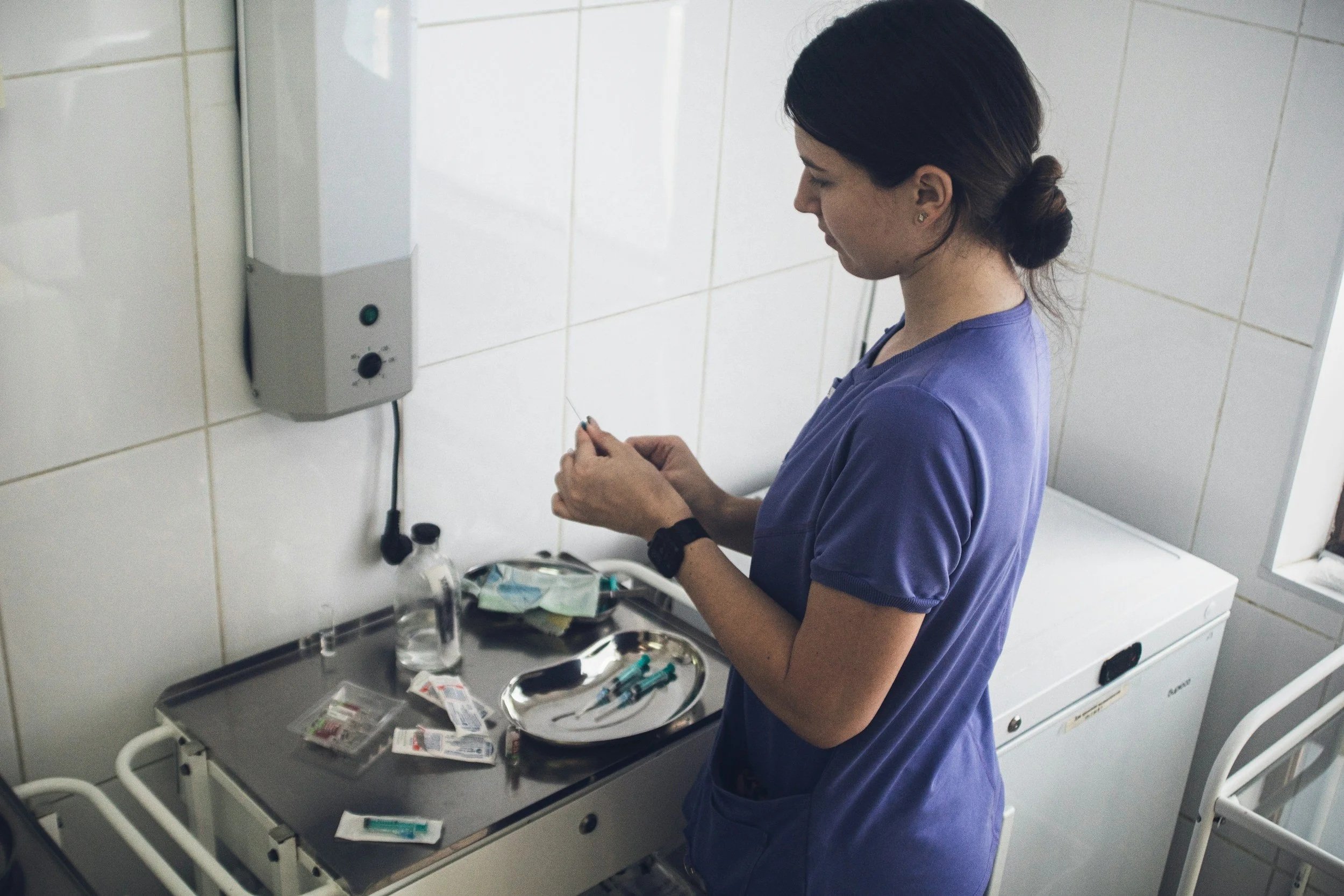What is a “mini-stim” egg freezing cycle?
A mini-stimulation, or ‘mini-stim cycle’, is a gentler form of egg retrieval that can be performed during the egg freezing process. Instead of using high doses of fertility medications, lower or oral doses are used to help the ovaries produce fewer but good quality eggs. This approach can be ideal for patients who prefer a more natural process, want to lower medication costs, or have a lower ovarian reserve. The goal is to achieve excellent outcomes while keeping treatment as comfortable as possible.
Mini-stim protocols are typically tailored to each patient and often involve a combination of oral medications with or without low doses of injectable gonadotropins. In most cases, the total gonadotropin dose is below 150 units per day, which reduces both medication exposure and overall treatment intensity.
Studies show that although mini-stim cycles generally retrieve fewer eggs, the quality of the eggs is comparable to those from conventional stimulation. For certain patients, this means a gentler process without sacrificing the chance of retrieving healthy eggs.
Who is a candidate for mini-stim?
Mini-stim protocols are not a one-size-fits-all approach, but it can be particularly appropriate for certain groups of patients based on ovarian reserve, past response to fertility treatment, and personal preference.
The number of eggs that can be stimulated during an egg retrieval cycle correlates with the number of eggs a patient has, or their ovarian reserve. Mini-stim protocols may be more appropriate for patients who might be starting off with a lower number of eggs to begin with, as measured during initial testing, since less medication is required to stimulate fewer follicles. Evidence also supports that mini-stim protocols can be especially beneficial for patients who were poor responders to conventional egg retrieval protocols. It can also be a potential choice for those who wish to avoid the intensity of full stimulation or have experienced significant side effects in previous egg retrieval cycles.
How can a mini-stim protocol decrease my risk of OHSS?
A mini-stim protocol naturally lowers the risk of ovarian hyperstimulation syndrome (OHSS) because it uses smaller doses of fertility medication. When the ovaries are stimulated more gently, good-quality eggs can still be obtained while minimizing discomfort, bloating, or fluid retention. This method allows providers to prioritize safety and overall well-being without compromising chances of successfully retrieving eggs.
As with all egg retrieval protocols during the egg freezing process, the choice between mini-stim and conventional stimulation is a deeply personal choice and should be made in partnership with your fertility specialist.
Resources:

Dr. Armando Hernandez-Rey is a board-certified reproductive endocrinology and infertility specialist and the founder and medical director of Conceptions Florida. Following his residency in obstetrics and gynecology at the University of Miami-Jackson Memorial Hospital, Dr. Hernandez-Rey completed a three-year fellowship in reproductive endocrinology and infertility at the UMDNJ School of Medicine. He holds three board certifications. He is certified by the American Board of Obstetrics and Gynecology in the subspecialty of reproductive endocrinology and infertility (REI), as well as OB/GYN and Surgery. Dr. Hernandez-Rey is an assistant clinical professor at the Herbert Wertheim College of Medicine at Florida International University and serves as an ad-hoc reviewer for the peer-reviewed journal, Fertility and Sterility.
Answered by Dr. Roy Handelsman from HRC Fertility. Understand how ovarian cysts and ovarian surgery may impact the egg freezing process.
Answered by Dr. Rashmi Kudesia from CCRM Fertility Houston. Here’s a checklist for before, during, and after your egg freezing consultation, including 11 questions you should ask the doctor.
Answered by Valerie Shafran, MSN, FNP-C from Extend Fertility. Discover why fertility experts urge women to stop taking GLP-1 agonists before an egg freezing cycle.
Answered by Dr. Nidhee Sachdev from South Coast Fertility Specialists. Explore what AMH tells us about a woman’s ovarian reserve or how many eggs she has left.
Answered by Dr. Hade from Generation Next Fertility. Understand how egg freezing does not cause long-term weight gain yet there is a chance of transient bloating.
Answered by Rijon Charne, JD from Sunray Fertility. Explore what a reproductive estate plan entails and the situations where having one can make a big difference.
Answered by Rijon Charne, JD from Sunray Fertility. Learn more about the importance of clinic disposition forms, including what they do and don’t cover.
Answered by Rijon Charne, JD from Sunray Fertility. Discover the legal nuances that can shape your options when freezing eggs or embryos.
Answered by Dr. Joshua Klein from Extend Fertility. Learn how birth control relates to egg freezing and if you will need to stop your hormonal birth control before starting the procedure.
Answered by Dr. Jesse Hade from Generation Next Fertility. Discover the important factors that affect chances of egg freezing success in your late thirties.
Answered by Sidonia Buchtova, PA-C, C-RHI from Refresh Psychiatry. Understand if you can stay on an SSRI or SNRI when freezing your eggs.
Answered by Sidonia Buchtova, PA-C, C-RHI from Refresh Psychiatry. Discover tips to help support your mental well-being during preparation, throughout the cycle, and after your egg retrieval, especially if you have a history of anxiety.
Answered by Dr. Katharina Spies from Vida Fertility. Learn about who should consider supplements before and during fertility preservation, and how supplements could support your egg freezing cycle.
Answered by Dr. Serin Seckin from Generation Next Fertility. Understand the key differences to help you make an informed decision that aligns with your personal and reproductive goals.
Answered by Dr. Ido Feferkorn from the Reproductive Medicine Group. Learn how Polycystic Ovarian Syndrome (PCOS) may affect the egg freezing process and outcomes of fertility preservation.
Answered by Dr. Meera Shah from Nova IVF. Understand the potential risks of egg freezing to help you evaluate if it is right for you.
Answered by Dr. Hade from Generation Next Fertility. Learn from start to finish the entire process of what happens on the final day of an egg freezing cycle.
Answered by Dr. Sahar M. Stephens from Northern California Fertility Medical Center. Understand the probability of pregnancy based on the number of eggs frozen and the age at which you freeze.
Answered by Dr. Alison Peck from HRC Fertility. Discover which medications are commonly used for ovarian stimulation during an egg freezing cycle.
Answered by Dr. Kathryn Snow from Piedmont Reproductive Endocrinology Group (PREG). Understand the side effects that you may experience when freezing your eggs.
Answered by Lia Schiller, MSN, AGNP-BC from Extend Fertility. Learn why IUDs can stay in place throughout the egg freezing process.
Answered by Dr. Woo from HRC Fertility. Learn how some medications need to be stopped for an egg freezing cycle while some medications can be continued.
Answered by Dr. Dan Nayot from The Fertility Partners. Learn how artificial intelligence is providing women with more information than ever before about their eggs.
Answered by Dr. Joshua Klein from Extend Fertility. Egg freezing doesn’t impact your chance of getting pregnant naturally, because egg freezing makes use of eggs that would otherwise have been lost.
Answered by Dr. Dan Nayot from The Fertility Partners. Understand the distinction between egg quantity and quality, and explore how AI is transforming egg quality analysis.
Answered by Dr. David E. Tourgeman from HRC Fertility. Understand what options exist for what to do with your frozen eggs if you decide not to use them for IVF.
Answered by Dr. Armando Hernandez-Rey from Conceptions Florida. Learn about minimal stimulation egg freezing cycles and how they can decrease the risk of ovarian hyperstimulation syndrome.
Answered by Dr. Ido Feferkorn from the Reproductive Medicine Group. Find out how egg freezing medications work and how protocols can be adjusted if you can’t take estrogen.
Answered by Dr. Ido Feferkorn from Reproductive Medicine Group. Learn how egg freezing fits into the menstrual cycle and how timing can be customized.
Answered by Dr. Elena Santiago from Vida Fertility. Understand the ins and outs of egg freezing in Spain as a non-resident, including timing, costs, and more.






























